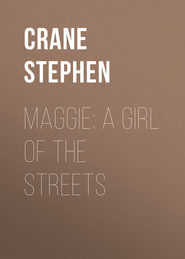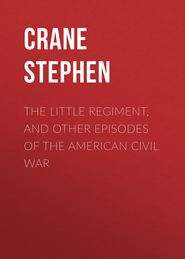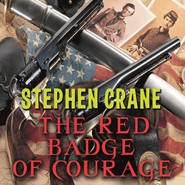По всем вопросам обращайтесь на: info@litportal.ru
(©) 2003-2025.
✖
The Red Badge of Courage: An Episode of the American Civil War
Настройки чтения
Размер шрифта
Высота строк
Поля
The youth took no part in them. As he walked along in careless line he was engaged with his own eternal debate. He could not hinder himself from dwelling upon it. He was despondent and sullen, and threw shifting glances about him. He looked ahead, often expecting to hear from the advance the rattle of firing.
But the long serpents crawled slowly from hill to hill without bluster of smoke. A dun-colored cloud of dust floated away to the right. The sky overhead was of a fairy blue.
The youth studied the faces of his companions, ever on the watch to detect kindred emotions. He suffered disappointment. Some ardor of the air which was causing the veteran commands to move with glee–almost with song–had infected the new regiment. The men began to speak of victory as of a thing they knew. Also, the tall soldier received his vindication. They were certainly going to come around in behind the enemy. They expressed commiseration for that part of the army which had been left upon the river bank, felicitating themselves upon being a part of a blasting host.
The youth, considering himself as separated from the others, was saddened by the blithe and merry speeches that went from rank to rank. The company wags all made their best endeavors. The regiment tramped to the tune of laughter.
The blatant soldier often convulsed whole files by his biting sarcasms aimed at the tall one.
And it was not long before all the men seemed to forget their mission. Whole brigades grinned in unison, and regiments laughed.
A rather fat soldier attempted to pilfer a horse from a dooryard. He planned to load his knapsack upon it. He was escaping with his prize when a young girl rushed from the house and grabbed the animal's mane. There followed a wrangle. The young girl, with pink cheeks and shining eyes, stood like a dauntless statue.
The observant regiment, standing at rest in the roadway, whooped at once, and entered whole-souled upon the side of the maiden. The men became so engrossed in this affair that they entirely ceased to remember their own large war. They jeered the piratical private, and called attention to various defects in his personal appearance; and they were wildly enthusiastic in support of the young girl.
To her, from some distance, came bold advice. "Hit him with a stick."
There were crows and catcalls showered upon him when he retreated without the horse. The regiment rejoiced at his downfall. Loud and vociferous congratulations were showered upon the maiden, who stood panting and regarding the troops with defiance.
At nightfall the column broke into regimental pieces, and the fragments went into the fields to camp. Tents sprang up like strange plants. Camp fires, like red, peculiar blossoms, dotted the night.
The youth kept from intercourse with his companions as much as circumstances would allow him. In the evening he wandered a few paces into the gloom. From this little distance the many fires, with the black forms of men passing to and fro before the crimson rays, made weird and satanic effects.
He lay down in the grass. The blades pressed tenderly against his cheek. The moon had been lighted and was hung in a treetop. The liquid stillness of the night enveloping him made him feel vast pity for himself. There was a caress in the soft winds; and the whole mood of the darkness, he thought, was one of sympathy for himself in his distress.
He wished, without reserve, that he was at home again making the endless rounds from the house to the barn, from the barn to the fields, from the fields to the barn, from the barn to the house. He remembered he had so often cursed the brindle cow and her mates, and had sometimes flung milking stools. But, from his present point of view, there was a halo of happiness about each of their heads, and he would have sacrificed all the brass buttons on the continent to have been enabled to return to them. He told himself that he was not formed for a soldier. And he mused seriously upon the radical differences between himself and those men who were dodging implike around the fires.
As he mused thus he heard the rustle of grass, and, upon turning his head, discovered the loud soldier. He called out, "Oh, Wilson!"
The latter approached and looked down. "Why, hello, Henry; is it you? What are you doing here?"
"Oh, thinking," said the youth.
The other sat down and carefully lighted his pipe. "You're getting blue my boy. You're looking thundering peek-ed. What the dickens is wrong with you?"
"Oh, nothing," said the youth.
The loud soldier launched then into the subject of the anticipated fight. "Oh, we've got 'em now!" As he spoke his boyish face was wreathed in a gleeful smile, and his voice had an exultant ring. "We've got 'em now. At last, by the eternal thunders, we'll like 'em good!"
"If the truth was known," he added, more soberly, "they've licked us about every clip up to now; but this time–this time–we'll lick 'em good!"
"I thought you was objecting to this march a little while ago," said the youth coldly.
"Oh, it wasn't that," explained the other. "I don't mind marching, if there's going to be fighting at the end of it. What I hate is this getting moved here and moved there, with no good coming of it, as far as I can see, excepting sore feet and damned short rations."
"Well, Jim Conklin says we'll get plenty of fighting this time."
"He's right for once, I guess, though I can't see how it come. This time we're in for a big battle, and we've got the best end of it, certain sure. Gee rod! how we will thump 'em!"
He arose and began to pace to and fro excitedly. The thrill of his enthusiasm made him walk with an elastic step. He was sprightly, vigorous, fiery in his belief in success. He looked into the future with clear proud eye, and he swore with the air of an old soldier.
The youth watched him for a moment in silence. When he finally spoke his voice was as bitter as dregs. "Oh, you're going to do great things, I s'pose!"
The loud soldier blew a thoughtful cloud of smoke from his pipe. "Oh, I don't know," he remarked with dignity; "I don't know. I s'pose I'll do as well as the rest. I'm going to try like thunder." He evidently complimented himself upon the modesty of this statement.
"How do you know you won't run when the time comes?" asked the youth.
"Run?" said the loud one; "run?–of course not!" He laughed.
"Well," continued the youth, "lots of good-a-'nough men have thought they was going to do great things before the fight, but when the time come they skedaddled."
"Oh, that's all true, I s'pose," replied the other; "but I'm not going to skedaddle. The man that bets on my running will lose his money, that's all." He nodded confidently.
"Oh, shucks!" said the youth. "You ain't the bravest man in the world, are you?"
"No, I ain't," exclaimed the loud soldier indignantly; "and I didn't say I was the bravest man in the world, neither. I said I was going to do my share of fighting–that's what I said. And I am, too. Who are you, anyhow? You talk as if you thought you was Napoleon Bonaparte." He glared at the youth for a moment, and then strode away.
The youth called in a savage voice after his comrade: "Well, you needn't git mad about it!" But the other continued on his way and made no reply.
He felt alone in space when his injured comrade had disappeared. His failure to discover any mite of resemblance in their viewpoints made him more miserable than before. No one seemed to be wrestling with such a terrific personal problem. He was a mental outcast.
He went slowly to his tent and stretched himself on a blanket by the side of the snoring tall soldier. In the darkness he saw visions of a thousand-tongued fear that would babble at his back and cause him to flee, while others were going coolly about their country's business. He admitted that he would not be able to cope with this monster. He felt that every nerve in his body would be an ear to hear the voices, while other men would remain stolid and deaf.
And as he sweated with the pain of these thoughts, he could hear low, serene sentences. "I'll bid five." "Make it six." "Seven." "Seven goes."
He stared at the red, shivering reflection of a fire on the white wall of his tent until, exhausted and ill from the monotony of his suffering, he fell asleep.
Chapter 3
When another night came, the columns, changed to purple streaks, filed across two pontoon bridges. A glaring fire wine-tinted the waters of the river. Its rays, shining upon the moving masses of troops, brought forth here and there sudden gleams of silver or gold. Upon the other shore a dark and mysterious range of hills was curved against the sky. The insect voices of the night sang solemnly.
After this crossing the youth assured himself that at any moment they might be suddenly and fearfully assaulted from the caves of the lowering woods. He kept his eyes watchfully upon the darkness.
But his regiment went unmolested to a camping place, and its soldiers slept the brave sleep of wearied men. In the morning they were routed out with early energy, and hustled along a narrow road that led deep into the forest.
It was during this rapid march that the regiment lost many of the marks of a new command.
The men had begun to count the miles upon their fingers, and they grew tired. "Sore feet an' damned short rations, that's all," said the loud soldier. There was perspiration and grumblings. After a time they began to shed their knapsacks. Some tossed them unconcernedly down; others hid them carefully, asserting their plans to return for them at some convenient time. Men extricated themselves from thick shirts. Presently few carried anything but their necessary clothing, blankets, haversacks, canteens, and arms and ammunition. "You can now eat and shoot," said the tall soldier to the youth. "That's all you want to do."
There was sudden change from the ponderous infantry of theory to the light and speedy infantry of practice. The regiment, relieved of a burden, received a new impetus. But there was much loss of valuable knapsacks, and, on the whole, very good shirts.
But the regiment was not yet veteranlike in appearance. Veteran regiments in the army were likely to be very small aggregations of men. Once, when the command had first come to the field, some perambulating veterans, noting the length of their column, had accosted them thus: "Hey, fellers, what brigade is that?" And when the men had replied that they formed a regiment and not a brigade, the older soldiers had laughed, and said, "O Gawd!"
Also, there was too great a similarity in the hats. The hats of a regiment should properly represent the history of headgear for a period of years. And, moreover, there were no letters of faded gold speaking from the colors. They were new and beautiful, and the color bearer habitually oiled the pole.
Presently the army again sat down to think. The odor of the peaceful pines was in the men's nostrils. The sound of monotonous axe blows rang through the forest, and the insects, nodding upon their perches, crooned like old women. The youth returned to his theory of a blue demonstration.
One gray dawn, however, he was kicked in the leg by the tall soldier, and then, before he was entirely awake, he found himself running down a wood road in the midst of men who were panting from the first effects of speed. His canteen banged rythmically upon his thigh, and his haversack bobbed softly. His musket bounced a trifle from his shoulder at each stride and made his cap feel uncertain upon his head.












